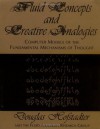251
Followers
4
Following
Manny Rayner's book reviews
I love reviewing books - have been doing it at Goodreads, but considering moving here.
Currently reading
The Greatest Show On Earth: The Evidence For Evolution
R in Action
Fluid Concepts and Creative Analogies
McGee on Food and Cooking: An Encyclopedia of Kitchen Science, History and Culture
Epistemic Dimensions of Personhood
Pattern Recognition and Machine Learning (Information Science and Statistics)
Relativity, Thermodynamics and Cosmology
The Cambridge Handbook of Second Language Acquisition
Galatea 2.2/a Novel
 People see different things in this unusual book. Let me start with the undisputed facts. The novel is written by Richard Powers, and its narrator is a character also called Richard Powers. The narrator and the author share a good deal of personal history. Among other things, they have both written three novels with the same titles and, as far as I can judge, similar content. They are both Americans who lived in Thailand when they were children, moved to Holland when they were adults, and learned to speak reasonably good Dutch. They both got their first degrees at the University of Illinois at Urbana-Champaign, initially studying physics and then switching to literature. They both returned to Urbana-Champaign when they were around 35 to take up a post as Writer in Residence.
People see different things in this unusual book. Let me start with the undisputed facts. The novel is written by Richard Powers, and its narrator is a character also called Richard Powers. The narrator and the author share a good deal of personal history. Among other things, they have both written three novels with the same titles and, as far as I can judge, similar content. They are both Americans who lived in Thailand when they were children, moved to Holland when they were adults, and learned to speak reasonably good Dutch. They both got their first degrees at the University of Illinois at Urbana-Champaign, initially studying physics and then switching to literature. They both returned to Urbana-Champaign when they were around 35 to take up a post as Writer in Residence. There are other areas where I am pretty certain that the author and the narrator have had different experiences. In particular, the narrator, while he is Writer-in-Residence, becomes involved in a daring research project, whose goal is to create an artificially intelligent entity capable of passing a literature exam. The AI is well done. Powers has worked with software, knows a fair amount about it, and has familiarized himself with neural nets and other relevant background. He's very interested in the philosophical question of "grounding". How can a piece of software know what language means without experiencing the world directly though its senses? More generally, does the meaning of language derive from its connection to the world, or can one understand language in its own terms?
In between the real and the imagined, there are things which may or may not reflect the author's personal history. In the story, "Powers" is in a state of near-suicidal depression after breaking up with the love of his life, a woman referred to only as C. The book alternates between the present, where Powers works on the AI project, and the past, where he remembers his life together with C. It's hard to be sure whether the relationship with C. really happened, but I'm inclined to believe it did, at least in some form.
The analogy that occurs to me is with Lolita, one of my favourite books. When he wrote it, Nabokov had recently moved to the US. He was an immigrant whose command of English, though good, was by no means perfect. He was also unhealthily attracted to young girls. I know this is to some extent controversial, but the theme turns up in so many of Nabokov's books that I can't believe it didn't reflect something real; I'm pretty sure he never acted on his impulses. At any rate, Nabokov made the brilliant pragmatic decision to use the material he had available. He made Humbert Humbert another immigrant with a similar sexual fixation, I believe greatly exaggerating the side of his character which he was most frightened and ashamed of, and created a masterpiece.
Similarly, I think Powers worked with the material he had - though it feels to me that he was closer to it, and the novel lacks the distance needed to be completely successful. By all accounts, Powers is a person who has spent his whole life living in a world of words. He's read obsessively since he was a small child, and he published three good novels before he was 35. The narrator of the book hardly experiences life directly at all, except though his relationship with C. When that relationship breaks down, he wonders if he has ever really understood her, or understood anything.
Can you live just though language? The book is a dense web of allusions and quotations: every page is full of ones I recognise, and I'm sure I missed plenty. To me, Helen, the AI program, is standing in for Powers himself. Helen can only experience the world through language. Powers is good at showing us how language, and especially great literature, can open up new ways to see the world, but even more importantly he shows us just how much it misses. Words are a poor substitute for love.
To me, and I see to many other readers, Helen is the most appealing character, and the one who redeems the book. She is just a piece of software, but she desperately wants to experience the world directly, through the senses she doesn't have, and escape the web of language; in the end, she helps the narrator reconnect to his life. Against all the odds, this friendship between a depressed workaholic and a machine ends up being a touching and uplifting story.











